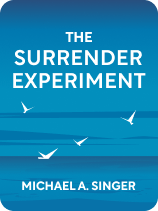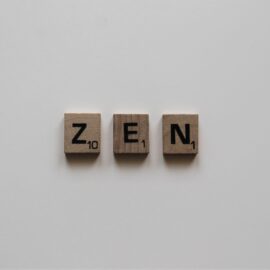

This article is an excerpt from the Shortform book guide to "The Surrender Experiment" by Michael A. Singer. Shortform has the world's best summaries and analyses of books you should be reading.
Like this article? Sign up for a free trial here.
Want to know how to surrender to the universe? How can you trust the universe and stop worrying, even in hard times?
In The Surrender Experiment, author Michael Singer explains his lifelong journey of self-realization and spirituality. Singer learned how to surrender to the universe by letting go of the need for control, in his book he also discusses how to survive hard times by confronting adversity.
Read on to learn how to surrender to the universe, even during hard times, according to Singer.
Surrendering to the Universe
The Surrender Experiment tells the extraordinary story of Michael Singer’s 40-year commitment to saying yes to the opportunities life presented him. In this book, which follows his best seller, The Untethered Soul, Singer imparts the spiritual lessons he’s learned about how to surrender to the universe and live a wholehearted life that’s free of judgments and devoted to service.
Michael “Mickey” Singer is an American spiritual teacher, motivational speaker, and author who founded the meditation and yoga center, The Temple of the Universe, in Alachua, Florida. He’s a lifelong practitioner of meditation and yoga and a successful software developer.
In this article, we’ll discuss how to surrender to the universe, even during hard times, according to the lessons in The Surrender Experiment about making your life exactly as the universe wants it to be.
Committing to Surrender
Once Singer had made the commitment to surrender to the universe, how would it actually play out in his life? In this section, we’ll discuss some of the major lessons he learned during this 40-year practice. We’ll describe some of the specific life circumstances to which Singer surrendered and show how each resulted in expanded opportunities and growth.
One of Singer’s first chances to practice surrender came in the form of a teaching opportunity. Through a series of decisions to say yes when his mind was saying no, he would learn that the universe knew better than him what was meant for his life.
When Singer became fully immersed in his meditation practice, he lost interest in pursuing his graduate degree and decided not to finish it. But when his professors urged him to continue, he applied his method for surrender by discarding his preference (not wanting to continue school) and finishing his degree. This led to a colleague asking him to teach classes at a local community college. He didn’t want to teach; he just wanted to be alone on his land, lost in meditation. So again he was tempted to say no. But he reminded himself it wasn’t about what he wanted. Life was presenting this opportunity, so he surrendered and said yes despite great mental resistance.
| Go With the Flow The idea of surrendering to the universe and what life wants mirrors Deepak Chopra’s assertion that true success comes from aligning with the spiritual energy of the universe that’s flowing through you. Chopra says trying to control external events in our lives is based in fear and gives us anxiety. However, when you connect with the spiritual realm, your life will naturally begin to flow with the energy of the universe, and this will bring you true success—a joyful life. Jay Shetty says this is why monks are the most peaceful, happy people in the world. They exist at all times in this state of harmonious flow with the energy of life. In Think Like a Monk, Shetty offers some advice on how to experience this flow. Some strategies he suggests are: – Explore your fears, asking yourself why you fear what you do. Continue asking “why?” until you’ve identified the deepest root of the fear. This will ultimately help you detach from those fears, and then let go of the need to try to control your environment. – Practice forgiveness and gratitude. Release the negative feelings you’re holding on to from the past, and shift your focus to what you’re grateful for in the present. – When you confront challenges in life, instead of thinking about what you need to do, think about how you need to be. For example, instead of thinking, “I need to confront this person and explain what they did wrong,” think, “I need to be patient and understanding in this interaction.” |
Singer also taught his classes with an attitude of surrender, allowing the conversation to flow in whatever direction it naturally went. As a result, his classes became wildly popular with students. Word of mouth spread and his classes filled to capacity. People on and around campus took interest in what he had to say and sought him out for his knowledge. Because he spoke of his meditation practice in his classes, people began coming to his land to meditate with him. Of course, being a person who craved solitude, Singer didn’t initially want this. But he realized this was a particularly important thing to surrender to because others were seeking out the kind of spiritual experiences he’d been having. He reasoned that this was clearly something the universe wanted to happen, so he allowed it to happen.
The next turn of events presented perhaps the most difficult challenge for surrendering to the universe: Singer went out of town for a few weeks, and when he returned he found a friend of his, Sandy, building a house for herself on his land. Sandy had been coming to the land regularly to join him for meditation and had decided she wanted to live there. Without even asking him, she had just started building. He was initially shocked. His mind instinctively rejected this possibility and reeled with confusion and indignance. But he was adept at controlling his responses by now, so he walked away and went to quietly contemplate this. He went through his surrender process in his mind. If it weren’t about his preferences, what would happen? Sandy would build her house on his land.
It didn’t take long for him to decide he had no choice but to surrender. He had made the commitment. So, he calmly accepted it, picked up his tools, and began to help her build. Not only was this the most difficult act of surrender so far, but it was also perhaps the most crucial because of what it led to.
| Setting Healthy Boundaries Although we can reasonably assume that Singer doesn’t believe you should allow people to take advantage of you, some of the examples of surrender he describes could be seen as having a lack of healthy boundaries by the standards of some current self-help advice. In fact, some experts say setting boundaries and saying no are essential to pursuing your highest contribution in life. In Essentialism, Greg McKeown says that in our modern technology-driven culture, boundaries have slowly disintegrated to the point that we’re expected to be available to everyone at all times. McKeown says you must push back against people who don’t respect your boundaries, because such people make their problems your problems, and they take advantage of you. It’s likely that most self-help experts today would consider building a house on someone else’s land without permission a serious boundary violation. |
When Sandy had her house built, she began bringing friends around regularly for meditation sessions. Singer also didn’t want this to happen, of course, but he went with the flow. The group grew and grew until a spiritual community had formed on his land. He came to realize that this was meant to be, and none of it would have happened if he had made decisions based on his personal preferences.
Trusting the Universe During Hard Times
After many years of wild success, Singer was forced to confront the greatest adversity he’d ever faced, and it taught him that even our obstacles and adversity can be used for good. He describes this life event as the final necessary step in dissolving his ego and learning how to surrender to the universe fully.
(Shortform note: Ryan Holiday says in The Obstacle is the Way that learning to see obstacles as empowering opportunities is fundamental to developing a Stoic mindset. He says any difficult situation will have an opportunity hidden within it, and it’s up to you to discover what it is and take advantage of it. In line with Singer’s experiment with letting go of his preferences and value judgments, Holiday says that judging situations as good or bad creates suffering. Situations themselves are neither inherently good nor bad—it’s how we respond to them that determines how they’ll affect us.)
In September 2003, Singer received an unexpected phone call from his attorney telling him he needed to come to the office right away. The FBI was raiding his business complex. Confused, Singer rushed to the office to find a full-scale raid in process. The agents were taking everything—from computers to disk drives, to every paper file in the office. Singer was told that the company was being investigated for fraud.
The next several years of Singer’s life would be tied up with lawyers, judges, and court hearings. From the beginning, he insisted he had no knowledge of any fraud and had never done anything inappropriate. But when he asked his lawyer what the chances were of the charges being dropped, the lawyer told him it would take a miracle. So Singer decided he must believe a miracle would happen.
This period of his life would be a difficult test of Singer’s inner strength and his resolve to let go of control. He reminded himself of his commitment to surrender, and he practiced radical acceptance of the situation, resolving to simply tell the truth and believe that justice would prevail. But he actually went one step further than acceptance and surrender: He decided he would use the situation as an opportunity to deepen his spiritual practice and his commitment to service. He stepped down as CEO of the company and used the time to write his book, The Untethered Soul, which would become a best seller and have an enormously positive effect on many people.
(Shortform note: The Untethered Soul was published in 2007. Its primary purpose is in teaching you how to live in the present moment and release painful thoughts of the past and worries of the future. Considering Singer’s legal situation at the time, writing a book about how to avoid stressing about future outcomes is quite apt.)
In January 2011, more than seven years after the FBI raid, a judge ruled that the fraud was committed by a few employees without Singer’s knowledge. The case against Singer was dropped. He had received his miracle. Upon reflection, Singer ultimately realized this kind of adversity was exactly what he needed to solidify his belief in surrendering completely to the universe and to learn how to use difficulty as an opportunity. After the outcome of that case, when he looked back on the 40-year results of his experiment with surrender, he knew this book was his next task.
| Practice Radical Acceptance Singer embraced the concept of “radical acceptance” during this difficult phase of his life. In her book on the topic, psychologist and spiritual teacher Tara Brach says accepting the painful experiences of life goes against our conditioning—we’re so used to resisting and avoiding pain and suffering. But she says when we learn to see and accept ourselves and our lives exactly as they are, it frees us. Rather than worrying about the future, regretting the past, or trying to control the future, we can just relax and accept what is. Brach says this process involves both your mind and your heart: You should use your mind to recognize and accurately identify what is happening in your life so you have a clear understanding of the problem. Then, use your heart to embrace your life and self with compassion. |

———End of Preview———
Like what you just read? Read the rest of the world's best book summary and analysis of Michael A. Singer's "The Surrender Experiment" at Shortform.
Here's what you'll find in our full The Surrender Experiment summary:
- The story of how a hippie college kid became a wealthy CEO
- How to make your life exactly as the universe wants it to be
- How to free your mind from limiting thoughts, emotions, and energy







Mmmm. Sounds like Singer made a decision to leave the company when it was in hardship, even if it was to deepen his spiritual practice. He made a decision to do something he desired.
I’m not entirely convinced by living a life free of desires/aversions. Otherwise I might just give all my money to the first person who asked for it, sleep with someone without protection and get riddled with an STI… the list goes on.
I’ve been learning all about healthy boundaries and healthy needs in recovery and Singer’s theory flies in the face of this somewhat… or does it? Keen to hear other thoughts!
x
Since then, I began to develop them, inspired and channeled through my Spirit Guides. I have been honored to host guided events in the United States and Spain.